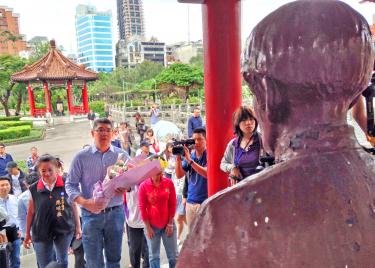Chinese Nationalist Party (KMT) Taipei mayoral candidate Sean Lien’s (連勝文) failure to pay his respects to victims of the 228 Massacre while visiting the 228 Memorial Park yesterday has sparked fierce controversy.
Lien visited the park to pay his respects to historical figures that he said are considered to have made great contributions to the nation.
During his visit, he laid flowers at the bronze busts of Cheng Chen-kung (鄭成功), a Ming Dynasty loyalist also known as Koxinga; Liu Ming-chuan (劉銘傳), the governor of Taiwan during the Qing Dynasy; Chiu Feng-jia (丘逢甲), a patriotic poet who has been honored for his resistance against the Japanese military after the signing of the Treaty of Shimonoseki; and Lien Heng (連橫), a historian, author of A General History of Taiwan and Sean Lien’s great-grandfather.
Sean Lien said his visit was prompted by his meeting earlier this week with former Democratic Progressive Party (DPP) chairman Shih Ming-te (施明德) — who later quit the party and led the “red shirt” protests against then-president Chen Shui-bian (陳水扁) in 2008 — who raised the idea of building a shrine for those who had contributed significantly to the nation.
“We are supportive of Shih’s idea of having a place to honor and remember the contributions and deeds of people of diverse backgrounds, ethnic groups and places of origin, who have, at different times, done great things for Taiwan. I think Taipei could work in this direction so that Taiwanese know what their predecessors achieved,” Sean Lien said.
Yet his failure to visit the 228 Memorial Monument in the park, which commemorates the victims of a brutal crackdown launched by the then-KMT regime on Feb. 27, 1947, was interpreted by the local media as intentional.
Yesterday was the eve of Retrocession Day, declared by the previous KMT government to observe the end of Japanese colonial rule of Taiwan and its “return” to the Republic of China in 1945.
Sean Lien’s spokesperson, Chien Chen-yu (錢震宇), confirmed that the visit was purposely made on the eve of Retrocession Day “to pay respect to the four historical figures in the 228 Memorial Park and to thank them for their devotion to the nation.”
“As for the 228 Memorial Monument, we will pay our respects another day,” he added.
Sean Lien told reporters that paying tribute to the 228 Memorial Monument was not on his campaign itinerary yesterday.
“[I] followed the planned itinerary. There was no arrangement made [for me to pay my respects to the 228 Memorial Monument today],” Sean Lien said.
Asked about the particularly long prayer he made at the bust of his great-grandfather Lien Heng, Sean Lien said he regretted that — while his camp has refrained from attacking their opponents’ families and ancestors — “the opposition camp has continued the tactic long practiced by the DPP, which is to harshly criticize my ancestors by distorting the facts, taking things out of context and using insulting words [against them].”
The reputation of Lien Heng, well known for his work on Taiwanese history, has been criticized over an opinion piece he wrote for Taiwan Nichinichi Shinpo (台灣日日新報), a daily newspaper published during the Japanese colonial era in 1930.
In the opinion piece, Lien Heng, who was said to have been paid by the Japanese colonial government to write the essay, encouraged the use of opium and called the practice “beneficial.”
Taiwanese literati were infuriated by the essay, resulting in Lien Heng’s ostracism and his relocation to China.
His son, Lien Chen-tung (連震東), returned to Taiwan in 1945 with the KMT regime and became one of the KMT officials responsible for the takeover of the government.
Source: Taipei Times - 2014/10/25





















